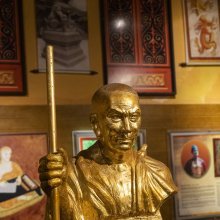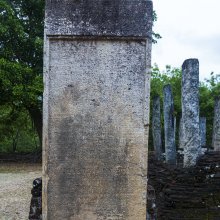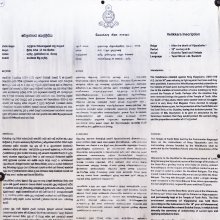Thera: 12 definitions
Introduction:
Thera means something in Buddhism, Pali, Hinduism, Sanskrit, Marathi, Jainism, Prakrit, biology. If you want to know the exact meaning, history, etymology or English translation of this term then check out the descriptions on this page. Add your comment or reference to a book if you want to contribute to this summary article.
Images (photo gallery)
(+1 more images available)
In Buddhism
Theravada (major branch of Buddhism)
Source: Access to Insight: A Glossary of Pali and Buddhist Terms"Elder." An honorific title automatically conferred upon a bhikkhu of at least ten years standing. Compare mahathera.Source: Pali Kanon: Pali Proper NamesName of a monk in Rajagaha. He lived in solitude, the virtues of which state he extolled. Hearing this, the Buddha sent for him and taught him how the solitary life could be perfected in detail (S.ii.282f).
Source: Dhamma Dana: Pali English GlossaryM (Ancient). bhikkhu having a seniority of at least ten years or more.
Source: Buddhist Information: A Survey of Paramattha DhammasThera can be translated as Elder or senior monk, a monk who has been ordained for at least ten years.
Theravāda is a major branch of Buddhism having the the Pali canon (tipitaka) as their canonical literature, which includes the vinaya-pitaka (monastic rules), the sutta-pitaka (Buddhist sermons) and the abhidhamma-pitaka (philosophy and psychology).
Biology (plants and animals)
Source: Google Books: CRC World Dictionary (Regional names)Thera in India is the name of a plant defined with Glinus oppositifolius in various botanical sources. This page contains potential references in Ayurveda, modern medicine, and other folk traditions or local practices It has the synonym Mollugo oppositifolia L. (among others).
Example references for further research on medicinal uses or toxicity (see latin names for full list):
· Phytochemistry
· Glimpses of Cytogenetics in India (1992)
· Bulletin de l’Herbier Boissier (1901)
· Taxon (1978)
· Tentamen Florae Abyssinicae (1847)
· Proceedings of the Indian Science Congress Association (1992)
If you are looking for specific details regarding Thera, for example side effects, extract dosage, diet and recipes, chemical composition, pregnancy safety, health benefits, have a look at these references.

This sections includes definitions from the five kingdoms of living things: Animals, Plants, Fungi, Protists and Monera. It will include both the official binomial nomenclature (scientific names usually in Latin) as well as regional spellings and variants.
Languages of India and abroad
Pali-English dictionary
Source: BuddhaSasana: Concise Pali-English Dictionarythera : (m.) an elder; a senior; a monk who has spent 10 years from his upasampadā. adj. old; elder.
Source: Sutta: The Pali Text Society's Pali-English DictionaryThera, (Vedic sthavira. Derivation uncertain. It may come from sthā in sense of standing over, lasting (one year or more), cp. thāvara old age, then “old=venerable”; (in meaning to be compared w. Lat. senior, etc. from num. sem “one”=one year old, i.e. lasting over one and many more years). Cp. also vetus=Gr. e)/tos, year, E. wether, one year old ram, as cpd. w. veteran, old man. Or it may come from sthā in der. *stheǔā in sthūra (sthūla: see etym. under thūla) thus, “strong= venerable”) t. t. only used with ref. to the bhikkhus of Gotama Buddha’s community.—(a) (adj.) senior, Vin. I, 47, 290 (th. bhikkhū opp. navā bh.), 159 (th. bhikkhu a senior bh. opp. to navaka bh. a novice), 187; II, 16, 212. Therânutherā bhikkhū seniors & those next to them in age dating not from birth, but from admission to the Order). Three grades are distinguished, thera bh. , majjhima bh. , nava bh. , at D. I, 78.—See also A. II, 23, 147, 168; V, 201, 348; D. III, 123 sq. , 218; Dh. 260, 261. In Saṅgha-thera, used of Bhikkhus not senior in the Order, the word thera means distinguished. Vin. II, 212, 303. In Mahāthera the meaning, as applied to the 80 bhikkhus so called, must also have some similar meaning Dīpv IV. 5 Psalms of the Brethren xxxvi.; J. V, 456. At A. II, 22 it is said that a bhikkhu, however junior, may be called thera on account of his wisdom. It is added that four characteristics make a man a thera —high character, knowing the essential doctrines by heart, practising the four Jhānas, and being conscious of having attained freedom through the destruction of the mental intoxications. It is already clear that at a very early date, before the Aṅguttara reached its extant shape, a secondary meaning of thera was tending to supplant that of senior-that is, not the senior of the whole Order, but the senior of such a part of the Saṅgha as live in the same locality, or are carrying out the same function.—Note. thera in thero vassiko at S. IV, 161 is to be read tero-vassiko.

Pali is the language of the Tipiṭaka, which is the sacred canon of Theravāda Buddhism and contains much of the Buddha’s speech. Closeley related to Sanskrit, both languages are used interchangeably between religions.
Marathi-English dictionary
Source: DDSA: The Molesworth Marathi and English Dictionarythēra (थेर).—m A caste or an individual of it. They are merry andrews, strolling players, monkey-exhibiters &c. 2 A boy that dances and sports in the guise of a female. 3 n m f Mimicry, mockery, taking off. v kara, āṇa, māja, nācava g. of o. 4 n Applied as a term for a queer, odd, vitiously eccentric, disreputable fellow. 5 n m Dissolute practices: also childish pranks. (These two senses arise from the quality of the business and the character of the subjects of the thēra caste).
Source: DDSA: The Aryabhusan school dictionary, Marathi-Englishthēra (थेर).—m A caste or an individual of it. They are merry-andrews. n m f Mimi- cry. n A term for a queer, disreput- able fellow. n m Dissolute practices, also childish pranks.
--- OR ---
thēra (थेर).—a Haggard, worn out, decrepit.
Marathi is an Indo-European language having over 70 million native speakers people in (predominantly) Maharashtra India. Marathi, like many other Indo-Aryan languages, evolved from early forms of Prakrit, which itself is a subset of Sanskrit, one of the most ancient languages of the world.
Sanskrit dictionary
Source: Cologne Digital Sanskrit Dictionaries: Edgerton Buddhist Hybrid Sanskrit DictionaryThera (थेर).—m. (= Pali id. compare sthera; MIndic for Sanskrit stha-vira, which has this meaning), old man (decrepit; not in religious sense): Mahāvastu iii.4.17 (verse).
Sanskrit, also spelled संस्कृतम् (saṃskṛtam), is an ancient language of India commonly seen as the grandmother of the Indo-European language family (even English!). Closely allied with Prakrit and Pali, Sanskrit is more exhaustive in both grammar and terms and has the most extensive collection of literature in the world, greatly surpassing its sister-languages Greek and Latin.
Prakrit-English dictionary
Source: DDSA: Paia-sadda-mahannavo; a comprehensive Prakrit Hindi dictionary1) Ṭhera (ठेर) in the Prakrit language is related to the Sanskrit word: Sthavira.
2) Thera (थेर) also relates to the Sanskrit word: Svavira.
3) Thera (थेर) also relates to the Sanskrit word: Sthavira.
Prakrit is an ancient language closely associated with both Pali and Sanskrit. Jain literature is often composed in this language or sub-dialects, such as the Agamas and their commentaries which are written in Ardhamagadhi and Maharashtri Prakrit. The earliest extant texts can be dated to as early as the 4th century BCE although core portions might be older.
Kannada-English dictionary
Source: Alar: Kannada-English corpusThēra (ಥೇರ):—
1) [noun] a Jaina or Buddhist sage.
2) [noun] an aged, elderly man.
Kannada is a Dravidian language (as opposed to the Indo-European language family) mainly spoken in the southwestern region of India.
See also (Relevant definitions)
Starts with (+22): Ter-aticampavanai, Terai, Teraikkunti, Teraimey, Teraimo, Teraipaytal, Teraipo, Teraittenkay, Teraittosham, Teraivilu, Teraiyar, Teraiyatanam, Terakam, Teral, Teralar, Teranai, Terani, Terankini, Terar, Teratutelital.
Ends with (+27): Anuthera, Apthera, Bandhujivaka-thera, Bhuta-thera, Cala-thera, Cetaka-thera, Chakkothera, Cittaka-thera, Dasaka-thera, Eraka-thera, Feretia apodanthera, Ganthera, Gathera, Jatithera, Kamthera, Kathera, Kothera, Kula-thera, Kulla-thera, Kuthera.
Full-text (+1051): Theravada, Sthavira, Sathera, Hemasali Vihara, Thupavamsa, Therada, Udakadayaka, Varananamuni, Kunti, Phalikasandana, Sihabodhi, Mantidatta, Mahanaga, Sujampatika, Suvannabhumi, Ajjunapupphiya, Anuthera, Suparicariya, Kaddhana, Thavareyya.
Relevant text
Search found 72 books and stories containing Thera, Thēra, Ṭhera, Ṭhēra; (plurals include: Theras, Thēras, Ṭheras, Ṭhēras). You can also click to the full overview containing English textual excerpts. Below are direct links for the most relevant articles:
Mahavamsa (by Wilhelm Geiger)
Chapter 14 - The Entry Into The Capital
Chapter 12 - The Converting Of Different Countries
A Discourse on Paticcasamuppada (by Venerable Mahasi Sayadaw)
Chapter 8 - The Story Of Cakkhupala Thera < [Part 3]
Chapter 10 - Story Of Yamaka < [Part 9]
Chapter 6 - Knowledge For Vipassana Practice < [Part 9]
Philosophy of language in the Five Nikayas (by K.T.S. Sarao)
2.1. The First Buddhist Council < [Chapter 1 - Introduction]
2.3. The Third Buddhist Council < [Chapter 1 - Introduction]
4. Conclusion < [Chapter 6 - Summary and Conclusions]
Guide to Tipitaka (by U Ko Lay)
Part 9 - The Theri Gatha Pali < [Chapter VIII - Khuddaka Nikaya]
Part 13 - Apadana Pali < [Chapter VIII - Khuddaka Nikaya]
Apadana commentary (Atthakatha) (by U Lu Pe Win)
Part 4 - Biography of Theras (Thera-apadāna)
Commentary on the stanza on bahussuta (much learned) < [Commentary on biography of Silent Buddhas (Paccekabuddha)]
Buddha finds disciples and starts his order < [Part 3 - Discourse on proximate preface (santike-nidāna)]
Dipavamsa (study) (by Sibani Barman)





